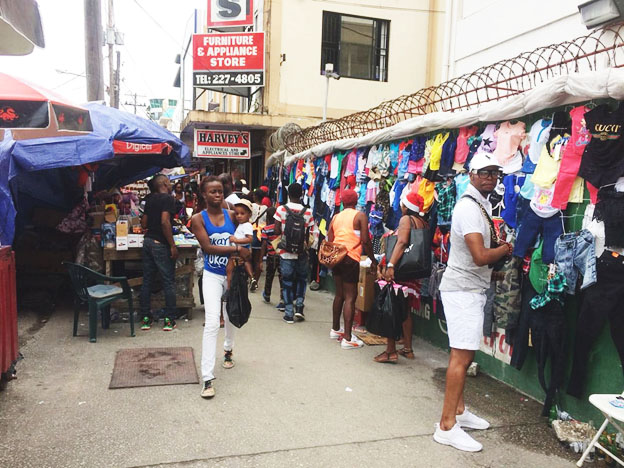Up until now, the state has missed the bus and even now, appears to be in no great haste to remedy what continues to be one of the country’s more unwholesome urban challenges… the inexorable ‘falling away’ of the capital, the new structures that have ‘gone up’ in the commercial heart of the capital notwithstanding. Historically, what Guyanese loosely describe as ‘Christmas shopping’ has always meant different things to different people. For some it has meant a ‘one off,’ ‘feel good’ splurge, a window through which to exhale from the stifling sensation of the preceding period. Here, the returns are mostly limited, allowing for a ‘living-in-the-moment’ rather than entering a zone of long-term elevation. It comes and it goes.
It is the environment of seasonal consumerism that is most apparent, the keenness of the shoppers and the hyped up ‘sales pitches’ of the vendors, all of which unfolds in an environment of relentless bump and grind. For the vendors – whatever the nature of their offerings – it is the pinnacle of the windfall seasons where the likely returns of persistent and energetic effort ‘trump’ the risk of some logistical transgression – as far as the trading rules are concerned – that can get the attention of the law. For sellers, whether these be street vendors or owners of the various shopping malls that have become part of the contemporary urban image, Christmas is regarded as a not-to-be-missed opportunity to ‘catch their hands,’ to go looking for the annual windfall.
If, as a mere street vendor, you miss the ‘splurge’ associated with what Guyanese loosely describe as ‘Christmas shopping’ the post-Christmas period and in many instances, the year ahead, is likely to throw up challenges arising out of the failure to ‘make hay’ during the surge of spending associated with the season. It is the ‘one-off’ nature of the trading window that triggers the frenzy. Simultaneously, Christmas makes its own healthy contribution to the continual wearing down of the capital under the weight of the demands of ‘the season.’ It is at this point that the full weight of commercial activity imposes an unbearable chaos on the country’s capital, often leaving what is usually an unsightly footprint long after the ‘feel good’ window has come and gone.
The country’s capital and what it otherwise represents has been the real victim. There are, usually, few if any seasonal protective contingencies to guard the capital against the chaos. Georgetown, over the years, the decades, has simply had to endure and move on, the scars of the seasonal rampage ‘thrown over’ into the year ahead. If we can do little to restrain the ‘excesses’ of Christmas, particularly in terms of the pronounced physical imprint that those excesses leave on the capital, we can at least learn to ‘manage’ the phenomenon in a more well-thought-out manner. Contextually, there is a need to move away from an approach that places Georgetown at the mercy of the Christmas rampage without, simultaneously, fashioning a contingency that takes account of the fact that our capital has a responsibility to the country, as a whole, that extends way beyond hosting the commercial surge that goes with the season.
Here, the point should be made that while the country’s capital should always represent the heart of the seasonal agenda that goes with a deeply ingrained and widely celebrated as a holiday period, the wider, no less important purposes for which the country’s capital exists should also be borne in mind.








